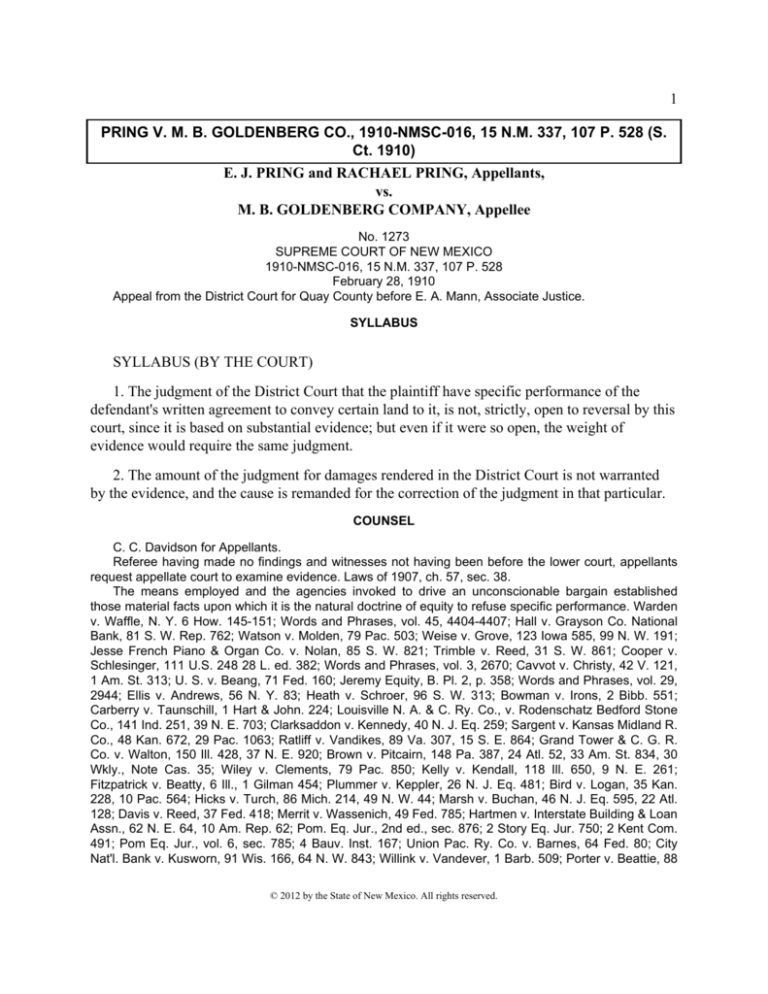
1
PRING V. M. B. GOLDENBERG CO., 1910-NMSC-016, 15 N.M. 337, 107 P. 528 (S.
Ct. 1910)
E. J. PRING and RACHAEL PRING, Appellants,
vs.
M. B. GOLDENBERG COMPANY, Appellee
No. 1273
SUPREME COURT OF NEW MEXICO
1910-NMSC-016, 15 N.M. 337, 107 P. 528
February 28, 1910
Appeal from the District Court for Quay County before E. A. Mann, Associate Justice.
SYLLABUS
SYLLABUS (BY THE COURT)
1. The judgment of the District Court that the plaintiff have specific performance of the
defendant's written agreement to convey certain land to it, is not, strictly, open to reversal by this
court, since it is based on substantial evidence; but even if it were so open, the weight of
evidence would require the same judgment.
2. The amount of the judgment for damages rendered in the District Court is not warranted
by the evidence, and the cause is remanded for the correction of the judgment in that particular.
COUNSEL
C. C. Davidson for Appellants.
Referee having made no findings and witnesses not having been before the lower court, appellants
request appellate court to examine evidence. Laws of 1907, ch. 57, sec. 38.
The means employed and the agencies invoked to drive an unconscionable bargain established
those material facts upon which it is the natural doctrine of equity to refuse specific performance. Warden
v. Waffle, N. Y. 6 How. 145-151; Words and Phrases, vol. 45, 4404-4407; Hall v. Grayson Co. National
Bank, 81 S. W. Rep. 762; Watson v. Molden, 79 Pac. 503; Weise v. Grove, 123 Iowa 585, 99 N. W. 191;
Jesse French Piano & Organ Co. v. Nolan, 85 S. W. 821; Trimble v. Reed, 31 S. W. 861; Cooper v.
Schlesinger, 111 U.S. 248 28 L. ed. 382; Words and Phrases, vol. 3, 2670; Cavvot v. Christy, 42 V. 121,
1 Am. St. 313; U. S. v. Beang, 71 Fed. 160; Jeremy Equity, B. Pl. 2, p. 358; Words and Phrases, vol. 29,
2944; Ellis v. Andrews, 56 N. Y. 83; Heath v. Schroer, 96 S. W. 313; Bowman v. Irons, 2 Bibb. 551;
Carberry v. Taunschill, 1 Hart & John. 224; Louisville N. A. & C. Ry. Co., v. Rodenschatz Bedford Stone
Co., 141 Ind. 251, 39 N. E. 703; Clarksaddon v. Kennedy, 40 N. J. Eq. 259; Sargent v. Kansas Midland R.
Co., 48 Kan. 672, 29 Pac. 1063; Ratliff v. Vandikes, 89 Va. 307, 15 S. E. 864; Grand Tower & C. G. R.
Co. v. Walton, 150 Ill. 428, 37 N. E. 920; Brown v. Pitcairn, 148 Pa. 387, 24 Atl. 52, 33 Am. St. 834, 30
Wkly., Note Cas. 35; Wiley v. Clements, 79 Pac. 850; Kelly v. Kendall, 118 Ill. 650, 9 N. E. 261;
Fitzpatrick v. Beatty, 6 Ill., 1 Gilman 454; Plummer v. Keppler, 26 N. J. Eq. 481; Bird v. Logan, 35 Kan.
228, 10 Pac. 564; Hicks v. Turch, 86 Mich. 214, 49 N. W. 44; Marsh v. Buchan, 46 N. J. Eq. 595, 22 Atl.
128; Davis v. Reed, 37 Fed. 418; Merrit v. Wassenich, 49 Fed. 785; Hartmen v. Interstate Building & Loan
Assn., 62 N. E. 64, 10 Am. Rep. 62; Pom. Eq. Jur., 2nd ed., sec. 876; 2 Story Eq. Jur. 750; 2 Kent Com.
491; Pom Eq. Jur., vol. 6, sec. 785; 4 Bauv. Inst. 167; Union Pac. Ry. Co. v. Barnes, 64 Fed. 80; City
Nat'l. Bank v. Kusworn, 91 Wis. 166, 64 N. W. 843; Willink v. Vandever, 1 Barb. 509; Porter v. Beattie, 88
© 2012 by the State of New Mexico. All rights reserved.
Wis. 22, 59 N. W. 499; Page on Contracts, vol. 3, sec. 624; McCabe v. Matthews, 155 U.S. 550, 39 L. ed.
256; 177 U.S. 376, 44 L. ed. 312, 116 Fed 590; Hennessy v. Woolworth, 128 U.S. 438, 32 L. ed. 500;
Willard v. Tayloe, 8 Wall. 557, 19 L. ed. 501; Holt v. Rogers, 8 Pet. 420; Pratt v. Carroll, 8 Cranch, 471;
Marr v. Shaw, 51 Fed. 860; Pom. Eq. Remedies, vol. 6, sec. 787; Friend v. Lamb, 34 Am. St. 672; Cuff v.
Dorland, 25 Atl. 577; Wollums v. Horsley, 20 S. W. 781; Pope Mfg. Co. v. Gormully, 144 U.S. 224, 36 L.
ed. 414; Cathcart v. Robinson, 5 Pet. 264, 8 L. ed. 120; Matlock v. Buller, 10 Ves. Jr. 292; Day v.
Newman, 2 Cox. Ch. Cas. 77; Leicester Piano Co. v. Front Royal Riverton Imp. Co., 55 Fed. 190; Wells,
et al. v. Houston, 69 S. W. 183; Wigmore on Evidence, secs. 1057, 1064, 2588; White v. Smith, 46 N. Y.
418.
Hawkins & Franklin for Appellee.
The question of damages and what shall constitute damages are matters to be ascertained by the
court in its discretion. American-English Encyclopaedia of Law, 2nd ed., vol. 26, p. 86; Worrall v. Munn,
38 N. Y. 138; Ashhurst v. Peck, 101 Ala. 499, 14 So. 541; and other cases cited, Am. Digest, vol. 48, p.
578.
The appellate court will not review the decision of the trial court when the same is founded on
conflicting evidence, and where there is evidence to support it and it is supported by the pleadings.
Newcomb v. White, 5 N.M. 435; Lynch v. Grayson, 7 N.M. 27; Torlina v. Trorlicht, 5 N.M. 149; Jarilla v.
Barela, 6 N.M. 239; Brown v. Lockhart, 12 N.M. 10; Carpenter v. Lindauer, 12 N.M. 388; Marquis v. Land
Grant Company, 12 N.M. 445; Ortiz v. Bank, 12 N.M. 519.
It is only when an oral agreement is clearly and satisfactorily proved by testimony above suspicion
and beyond reasonable doubt that it will be enforced to establish rights in land at variance with the
muniments of title. Moore v. Crawford, 130 United States 134; Lalone v. United States, 164 United States
257; Ives v. Hazzard, 67 American Reports 504; Farrar v. Churchill, 135 United States 615; Baltzar v. R.
R., 115 United States 645; Atlantic, etc., v. Brady, 107 United States 203; Howland v. Blake, 97 United
States 626; Western R. R. v. Babcock, 6 Metcalf 352; Eyre v. Potter, 15 Howard 42; United States v.
Hancock, 133 United States 197; Kent v. Lasley, 24 Wisconsin 654; English Equity Reports, vol. 7, p.
254.
The mere fact that defendant entered into a losing bargain or one where plaintiff will reap great gain
is clearly never a ground to refuse specific performance. Ready v. Noakes, 29 N. J. Equity 499; Crouse v.
Holman, 19 Ind. 38; Rou v. Seiderberg, 104 N. Y. S. 798; Hammond v. Decker, 102 S. W. 455; Pittsburg,
etc., R. Co. v. Rose, 74 Pa. St. 369; Sharpe v. United States, 112 Federal 879; Cathcart v. Robinson, 5
Peters 271; Franklin Telephone Co. v. Harrison, 145 U.S. 472; Whitted v. Fuquay, 37 Southeastern 141;
Lee v. Kirby, 104 Massachusetts 428; Southern Ry. Co. v. Franklin & P. R. Co., 32 S. E. 490; Ayres v.
Baumgarten, 15 Illinois 447; Pomeroy's Equity, vol. 6, p. 1312, 3d edition; Searle v. Lackawanna &
Bloomsburg Railroad Company, 9 Casey 57; East Pennsylvania Railroad Company v. Heister, 4 Wright
53.
JUDGES
Abbott, J. Associate Justice Mechem did not participate.
AUTHOR: ABBOTT
OPINION
{*340} STATEMENT OF THE CASE.
{1} This is an action to obtain specific performance of a written agreement for the
conveyance of certain land at Tucumcari, in Quay County, between the plaintiff, the M. B.
Goldenberg Company, here the appellee, and the defendants, E. J. Pring and Rachael W. Pring,
husband and wife, here the appellants, and for damages for the failure of the defendants to
perform their said agreement.
{2} In addition to denying ownership of the property in question and the execution of the
alleged agreement, the defendants answered that they were induced by fraud, deceit and
misrepresentation to sign the agreement; that one Floersheim represented to them that the land in
question was being purchased by one M. B. Goldenberg, as the agent of the Chicago, Rock
Island and El Paso Railroad Company, and that said company desired to purchase the same for
shop and terminal facilities, and that said Floersheim represented that if said railroad company
could procure the same it would greatly enhance the value of the remainder of appellants' land
lying between said railroad land and the main portion of the town of Tucumcari; and that, relying
upon such representation, the said appellants entered into said agreement, and that thereupon the
said appellants executed the agreement sued on; that said Pring, one of the appellants, was
almost totally blind and could not read said contract, and that said contract was misread to
appellants as a contract between appellants and {*341} M. B. Goldenberg as agent for said
railroad company, and not as a contract between appellants and appellee, and to describe eighty
acres of land adjoining the homestead of one Wertheim, as said company should designate, and
that appellants signed said contract believing it to be an agreement between them and said
railroad company. They also allege that the sum of $ 2500.00 which was paid to them for said
land, was a wholly inadequate price for it, unless it was actually to be sold to said railway
company, and the value of their remaining land enhanced thereby, and that upon the discovery of
the fraud, which they say had been practiced upon them, they tendered the $ 2500.00 which they
had received to the plaintiff. The plaintiff replied, denying the fraud and misrepresentation
alleged.
{3} The case was sent to a referee, who took the evidence, and reported it to the court, which
found the issues for the plaintiff, ordered the defendants to make conveyance in accordance with
the terms of the agreement, and that they should pay to the plaintiff, as damages, six hundred
dollars, from which order and judgment the defendants appealed.
OPINION OF THE COURT.
{4} We notice, first, the claim of the appellants that the failure of the plaintiff to deny the
allegation of their answer, in relation to inadequacy of consideration, left it judicially admitted,
and they were not bound to offer proof of it. That question was not raised in the trial court, nor
was it there suggested that inadequacy of consideration was not well pleaded, although the
conditional form in which it is put, to say the least cast doubt on it. Both parties, however, in the
trial seem to have assumed that inadequacy of consideration was a defense alleged in the case
and to have introduced evidence on that assumption, without objection, on the ground that such
was not the case. That objection cannot be made here for the first time, and we must treat the
question of inadequacy of consideration as being before this court for review on the findings and
evidence.
{5} Taking up now the main issue in the case, that of {*342} the fraud which the appellants
allege was practiced upon them, we have first to consider what force shall be given to the finding
of the trial court on that point. While it is true, as counsel for the appellants suggest that the court
did not hear the witnesses but based its conclusion on the evidence as reported to it by the
referee, it is also true that this court does not ordinarily sit to try questions of fact, and will not,
even in such a case as the one at bar, disturb the findings of the trial court on questions of fact,
unless it is very clear that wrong has been committed. Counsel for the appellants ask us to
examine the case in accordance with the provisions of Chapter 57, Section 38, of the Session
Laws of 1907, and that, of course, it is our duty to do. But while it is there provided that this
court shall base its judgment in a case coming to it by appeal or writ of error "on the facts
contained in the record alone", it is also provided that "it shall review said cause," namely, one
tried by the court without a jury, "in the same manner and to the same extent as if it had been
tried by a jury." And in Lynch v. Grayson, 7 N.M. 26, 32 P. 149, this court said: "It was not the
intention of the territorial legislature, by the Act of January 5, 1889, section 4, providing that in
cases where a jury has been waived, and the cause tried by the court, 'the Supreme Court' 'shall
review said cause in the same manner, and to the same extent, as if it had been tried by a jury,'
that the Supreme Court should pass upon the weight of the evidence introduced in the court
below, but upon the sufficiency of the facts as found to support the conclusions of law." The
language there considered is identical with that of the statute called to our attention bearing upon
the question to be determined. The findings of the trial court in this cause therefore rest on the
same legal basis as would the verdict of a jury, and that this court will not disturb the verdict of a
jury which rests on evidence legally sufficient to sustain it, is too well settled to be open for
discussion.
{6} From the examination we have given the evidence in this case, however, we are
convinced that even if the law were much more favorable to the appellants than it is in that
particular, their evidence would not measure up to {*343} its requirements. As the authorities
cited for the appellee abundantly show, the evidence of fraud "upon which to found a verdict or
decree must be clear and convincing." Lalone v. United States, 164 U.S. 255, 41 L. Ed. 425, 17
S. Ct. 74. See also, Farrar v. Churchill, 135 U.S. 609, 34 L. Ed. 246, 10 S. Ct. 771; Moore v.
Crawford, 130 U.S. 122, 32 L. Ed. 878, 9 S. Ct. 447. It falls far short of the standard thus
established, in the case at bar, alike on the question of deceit and that of inadequacy of
consideration, assuming the latter to be before this court. The value of the testimony of E. J.
Pring as an accurate and reliable account of the events with which it deals, is much impaired
through other evidence in the case whose veracity there is no apparent reason to doubt, and even
by comparison of some of its parts with each other. Thus, he testified that Mr. Moore offered
him $ 100.00 per acre for land, but on cross examination he said: "The other day I said to Moore,
'Will you give me one hundred dollars per acre for my land: He said he wanted some': That is the
offer he made." He also testified that Dr. Nichols offered him one hundred dollars per acre, and
that he had expected to have him as a witness, but he was away. Afterwards, against his
objection, the case was re-opened before the referee, for the introduction of the testimony of Dr.
Nichols who had been away but had returned. He testified that he had made no offer whatever
for the land. The evidence of Mrs. Pring is somewhat discredited by the fact that she obtained the
written agreement on which the suit is founded from the plaintiff for the purpose of examining it,
and then attempted to destroy it. Even if she believed that it was procured by fraud, she should
have been willing, in fairness, to have it used as evidence for what it was worth. If she thought it
proper to destroy that most important piece of evidence, it is only a fair inference that she was
ready, perhaps under a feeling that she and her husband had been wronged, otherwise to take
from or add to the evidence in the case without strict regard to facts. 16 Cyc. 1058-9. There is a
great discrepancy between the sworn statements of the Prings in their answer and their testimony
on material points. They alleged that the original misrepresentation was made to {*344} them by
Floersheim to the effect that M. B. Goldenberg wished to buy their land for use by the Chicago,
Rock Island & El Paso Railroad Company, when they three were by themselves at the residence
of the Prings; that they said they would sell to Goldenberg for that purpose; that Floersheim then
telephoned Goldenberg, who came to the house, drew up the agreement, said he was representing
the railroad company, and read the agreement to them as one between them and himself as the
agent of the railroad company. The agreement was in evidence, and was between them and the
Goldenberg Company, without any mention of any railroad company. Floersheim and
Goldenberg both testified that while they and the appellants were together about the matter, there
was nothing said about any railroad company, that the agreement was correctly read by
Goldenberg and that Mrs. Pring then read it, her husband being unable from blindness, to read.
The appellants testified later, but neither ever testified that on the occasion last referred to there
was anything said about any railroad company, or that Goldenberg did not read the agreement to
them as it was written, or that Mrs. Pring did not herself read it. This failure to substantiate the
sworn statements in their pleadings as to matters peculiarly within their knowledge, by
testimony, as witnesses, must weigh somewhat against them. Moore v. Crawford, supra.
Besides, it seems almost or quite incredible, if Floersheim had, as they say, made to them the
misrepresentation on the strength of which they agreed to sell their land, namely that Goldenberg
wanted it for a railroad, which would use it and enhance the value of their remaining land, that
they should immediately thereafter sign an agreement written by Goldenberg in their presence, in
which not a word was said about a railroad, and should even allow him to go away with the
agreement, without so much as speaking of a railroad.
{7} The conclusion of the district court that the plaintiff was entitled to specific performance
by the defendants {*345} of their agreement to convey the land in question to it, is fully
sustained by the evidence in the case.
{8} As to the award of damages to the amount of six hundred dollars against the defendants,
we find no evidence to warrant a finding of so much as that sum. There is evidence that the
plaintiff had paid six hundred dollars as counsel fees in the cause, and it seems probable that the
judgment of the court was based on that, as there was no other evidence of damage to that
amount; but that cannot be said with certainty, as no findings of fact were made or requested.
The attorneys for the appellee admit however, that attorneys' fees are not recoverable in this
case. There is, however, evidence of the value of the use of the land for the time it had been
detained from the plaintiff, although not of a very clear and definite nature. As we understand the
evidence for the plaintiff on that point, it is that the rental value of the land, when broken, was
five dollars per acre for the season, and that it cost two dollars and fifty cents per acre to break it.
It did not clearly appear that any of the land had been broken prior to the agreement in question.
{9} We think, therefore, that while there is evidence to sustain a judgment of two hundred
dollars, damages, that is, of two dollars and fifty cents per acre, for eighty acres, one for a larger
amount is not warranted.
{10} If the appellee shall, within thirty days, here remit four hundred dollars of the amount
found as damages by the District Court, the judgment will thereupon be affirmed, otherwise it
will be reversed and the cause remanded.
——————————


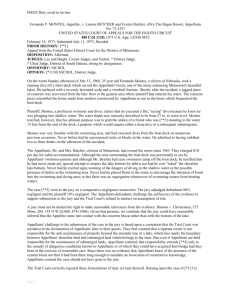
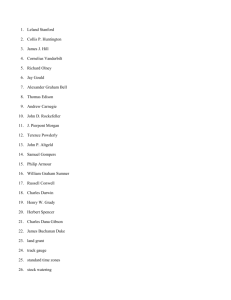
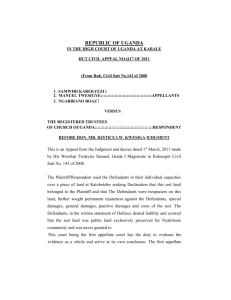
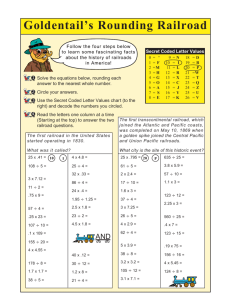
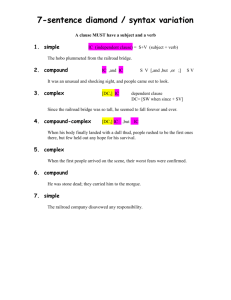

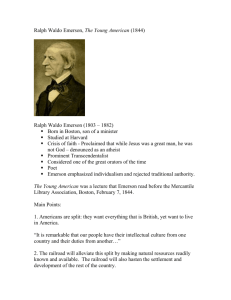
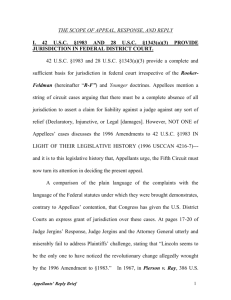

![Davis Contractors v Fareham Urban DC [1956]](http://s3.studylib.net/store/data/008153539_1-65e6b3f58e7637ad8141ad465a36fdc6-300x300.png)